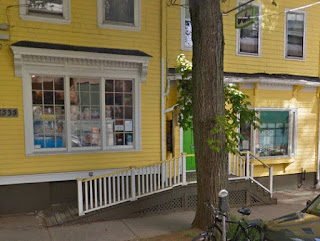 |
| Woozles on Birmingham Street |
All the ramp talk finally got me to read the encroachment by-law that Liz Crocker of Woozles, Canada's oldest children's bookstore, complained about. It says:
License RequiredI guess there's no getting around the fact that HRM owns the sidewalks. Does the ownership have a purpose, or is it just a source of revenue?
3 No person shall construct or maintain any encroachment or make use of a street (defined to include sidewalks)for construction or restoration purposes in the municipality unless an encroachment license has been issued by the municipality.
Permitted encroachments are listed exhaustively and alphabetically:
(i) A structure includes any building, bridge, pedway, balcony, bay window, elevator, fence, foundation wall, grating, hatch, hatchway, loading platform, manhole, porch, portico, railing, retaining wall, sign attached to a building, step, storage tank, tunnel, vault, veranda, or any part thereof;At first I thought "Good for Woozles - a ramp isn't on the list, so they should get their money back." On sober reflection, I think "Bad for wheelchairs, because ramps aren't even permitted structures."
There must be an interpretation somewhere in that alternate reality known as 'Municipal Compliance' that ramps fall under the category of steps or pedways or something. It allows inspectors to grant permits to build Woozle-like ramps. Such an interpretation would make a ramp OK for an inspector to approve on their own:
the following may be issued by the Inspector without the authorization of Council:
(iii) steps, foundations and other structures - for buildings where steps, foundations and other building features must encroach, or where an encroachment already exists, the area of encroachment may be increased provided there is no additional encroachment toward the curb for a period of 5 years, renewable after inspection;I've often wondered what you would do if you lived in a charming old Halifax house and developed a need for a ramp. At 1336 Birmingham, say, just down the way from Woozles. Would the inspector say "No, you can only have a portable ramp." That seems cruel, and a little perverse. After you leave the house in your wheelchair, what do you do with the ramp? This seems like a must encroach situation - even veteran inspectors of Mother's Pizza wouldn't keep you out of your own house. Surely!
 |
| 1336 Birmingham |
 |
| Legal Information Society of Nova Scotia |
If you believe the Mayor, Game Changers is the thing. How does HRM's encroachment by-law, which never heard of ramps, change the game for wheelchair users? It's all happy talk, as Contrarian is fond of saying.
Sometimes government is boring and prosaic. HRM needs to do the unglamorous work of removing physical and virtual barriers for people with disabilities. Ramps should be must encroach structures. HRM should remove encroachment fees for ramps at businesses and for homeowners trying to age-in-place. A top to bottom review of by-laws would reveal many barriers, unintended or not, that should be abandoned or changed.
Gerry Post, a member of HRM's Accessibility Advisory Committee, has proposed that HRM take care of issues it can deal with completely on its own. This is a good example. It's entirely within their power to change the by-law.
The upcoming accessibility legislation, if it as much of a game-changer as it is meant to be, will force this change. Why wait?
No comments:
Post a Comment